
Allergies
What are Allergies?
Allergies are the body’s immune system’s overreaction to substances that are usually harmless to most people. These substances are called allergens and can include pollen, dust mites, pet dander, certain foods, insect stings, and medications.
Common Types of Allergies
- Food Allergies: Triggered by foods like peanuts, shellfish, eggs, or milk.
- Seasonal Allergies (Hay Fever): Caused by pollen from trees, grasses, and weeds.
- Dust and Mold Allergies: Caused by indoor allergens like dust mites or mold spores.
- Pet Allergies: Reactions to proteins in an animal’s skin, saliva, or urine.
- Insect Sting Allergies: Triggered by stings from bees, wasps, or ants.
- Drug Allergies: Caused by medications like penicillin or other antibiotics.
- Skin Allergies: Includes conditions like eczema and contact dermatitis.
Symptoms of Allergies
- Sneezing and runny nose
- Itchy or watery eyes
- Skin rashes or hives
- Swelling of lips, face, or throat
- Shortness of breath or wheezing
- Nausea or vomiting (especially with food allergies)
- In severe cases, anaphylaxis – a life-threatening allergic reaction
Causes and Risk Factors
- Family history of allergies
- Asthma or other allergic conditions
- Repeated exposure to allergens
- Immune system sensitivity
Diagnosis
- Skin Prick Test
- Blood Test (IgE levels)
- Elimination Diet (for food allergies)
- Patch Testing (for contact allergies)
Treatment and Management
- Avoidance of Allergens: The best way to manage allergies is to avoid known triggers.
- Medications:
- Antihistamines
- Decongestants
- Nasal corticosteroids
- Epinephrine auto-injectors (for severe allergic reactions)
- Immunotherapy (Allergy Shots): Gradually desensitizes the immune system to specific allergens.
Prevention Tips
- Keep windows closed during high pollen seasons
- Use air purifiers and keep indoor spaces clean
- Read food labels carefully
- Wear protective clothing when dealing with allergens
- Carry emergency medications if you have a history of severe allergies
When to Seek Medical Help
Seek immediate medical attention if you experience:
- Difficulty breathing
- Swelling of the face or throat
- Dizziness or fainting
- Signs of anaphylaxis
Conclusion
Allergies are common and manageable. With proper diagnosis, treatment, and preventive measures, most people with allergies can lead healthy, active lives.
